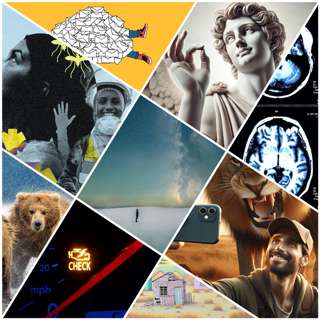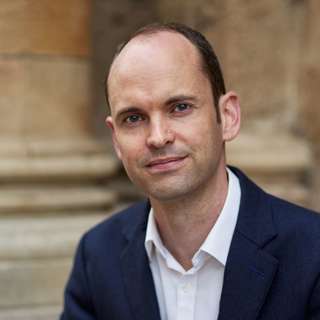
#163 – Toby Ord on the perils of maximising the good that you do
Effective altruism is associated with the slogan "do the most good." On one level, this has to be unobjectionable: What could be bad about helping people more and more?But in today's interview, Toby Ord — moral philosopher at the University of Oxford and one of the founding figures of effective altruism — lays out three reasons to be cautious about the idea of maximising the good that you do. He suggests that rather than “doing the most good that we can,” perhaps we should be happy with a more modest and manageable goal: “doing most of the good that we can.”Links to learn more, summary and full transcript.Toby was inspired to revisit these ideas by the possibility that Sam Bankman-Fried, who stands accused of committing severe fraud as CEO of the cryptocurrency exchange FTX, was motivated to break the law by a desire to give away as much money as possible to worthy causes.Toby's top reason not to fully maximise is the following: if the goal you're aiming at is subtly wrong or incomplete, then going all the way towards maximising it will usually cause you to start doing some very harmful things.This result can be shown mathematically, but can also be made intuitive, and may explain why we feel instinctively wary of going “all-in” on any idea, or goal, or way of living — even something as benign as helping other people as much as possible.Toby gives the example of someone pursuing a career as a professional swimmer. Initially, as our swimmer takes their training and performance more seriously, they adjust their diet, hire a better trainer, and pay more attention to their technique. While swimming is the main focus of their life, they feel fit and healthy and also enjoy other aspects of their life as well — family, friends, and personal projects.But if they decide to increase their commitment further and really go all-in on their swimming career, holding back nothing back, then this picture can radically change. Their effort was already substantial, so how can they shave those final few seconds off their racing time? The only remaining options are those which were so costly they were loath to consider them before.To eke out those final gains — and go from 80% effort to 100% — our swimmer must sacrifice other hobbies, deprioritise their relationships, neglect their career, ignore food preferences, accept a higher risk of injury, and maybe even consider using steroids.Now, if maximising one's speed at swimming really were the only goal they ought to be pursuing, there'd be no problem with this. But if it's the wrong goal, or only one of many things they should be aiming for, then the outcome is disastrous. In going from 80% to 100% effort, their swimming speed was only increased by a tiny amount, while everything else they were accomplishing dropped off a cliff.The bottom line is simple: a dash of moderation makes you much more robust to uncertainty and error.As Toby notes, this is similar to the observation that a sufficiently capable superintelligent AI, given any one goal, would ruin the world if it maximised it to the exclusion of everything else. And it follows a similar pattern to performance falling off a cliff when a statistical model is 'overfit' to its data.In the full interview, Toby also explains the “moral trade” argument against pursuing narrow goals at the expense of everything else, and how consequentialism changes if you judge not just outcomes or acts, but everything according to its impacts on the world.Toby and Rob also discuss:The rise and fall of FTX and some of its impactsWhat Toby hoped effective altruism would and wouldn't become when he helped to get it off the groundWhat utilitarianism has going for it, and what's wrong with it in Toby's viewHow to mathematically model the importance of personal integrityWhich AI labs Toby thinks have been acting more responsibly than othersHow having a young child affects Toby’s feelings about AI riskWhether infinities present a fundamental problem for any theory of ethics that aspire to be fully impartialHow Toby ended up being the source of the highest quality images of the Earth from spaceGet this episode by subscribing to our podcast on the world’s most pressing problems and how to solve them: type ‘80,000 Hours’ into your podcasting app. Or read the transcript.Producer and editor: Keiran HarrisAudio Engineering Lead: Ben CordellTechnical editing: Simon MonsourTranscriptions: Katy Moore
8 Syys 20233h 7min
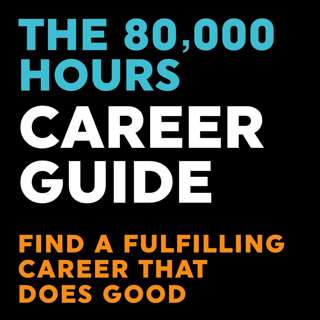
The 80,000 Hours Career Guide (2023)
An audio version of the 2023 80,000 Hours career guide, also available on our website, on Amazon, and on Audible.If you know someone who might find our career guide helpful, you can get a free copy sent to them by going to 80000hours.org/gift.Chapters:Rob's intro (00:00:00)Introduction (00:04:08)Chapter 1: What Makes for a Dream Job? (00:09:09)Chapter 2: Can One Person Make a Difference? What the Evidence Says. (00:33:02)Chapter 3: Three Ways Anyone Can Make a Difference, No Matter Their Job (00:43:33)Chapter 4: Want to Do Good? Here's How to Choose an Area to Focus on (00:58:50)Chapter 5: The World's Biggest Problems and Why They're Not What First Comes to Mind (01:12:03)Chapter 6: Which Jobs Help People the Most? (01:42:15)Chapter 7: Which Jobs Put You in the Best Long-Term Position? (02:19:11)Chapter 8: How to Find the Right Career for You (02:59:26)Chapter 9: How to Make Your Career Plan (03:32:30)Chapter 10: All the Best Advice We Could Find on How to Get a Job (03:55:34)Chapter 11: One of the Most Powerful Ways to Improve Your Career - Join a Community (04:24:21)The End: The Entire Guide, in One Minute (04:35:49)Rob's outro (04:40:05)
4 Syys 20234h 41min

#162 – Mustafa Suleyman on getting Washington and Silicon Valley to tame AI
Mustafa Suleyman was part of the trio that founded DeepMind, and his new AI project is building one of the world's largest supercomputers to train a large language model on 10–100x the compute used to train ChatGPT.But far from the stereotype of the incorrigibly optimistic tech founder, Mustafa is deeply worried about the future, for reasons he lays out in his new book The Coming Wave: Technology, Power, and the 21st Century's Greatest Dilemma (coauthored with Michael Bhaskar). The future could be really good, but only if we grab the bull by the horns and solve the new problems technology is throwing at us.Links to learn more, summary and full transcript.On Mustafa's telling, AI and biotechnology will soon be a huge aid to criminals and terrorists, empowering small groups to cause harm on previously unimaginable scales. Democratic countries have learned to walk a 'narrow path' between chaos on the one hand and authoritarianism on the other, avoiding the downsides that come from both extreme openness and extreme closure. AI could easily destabilise that present equilibrium, throwing us off dangerously in either direction. And ultimately, within our lifetimes humans may not need to work to live any more -- or indeed, even have the option to do so.And those are just three of the challenges confronting us. In Mustafa's view, 'misaligned' AI that goes rogue and pursues its own agenda won't be an issue for the next few years, and it isn't a problem for the current style of large language models. But he thinks that at some point -- in eight, ten, or twelve years -- it will become an entirely legitimate concern, and says that we need to be planning ahead.In The Coming Wave, Mustafa lays out a 10-part agenda for 'containment' -- that is to say, for limiting the negative and unforeseen consequences of emerging technologies:1. Developing an Apollo programme for technical AI safety2. Instituting capability audits for AI models3. Buying time by exploiting hardware choke points4. Getting critics involved in directly engineering AI models5. Getting AI labs to be guided by motives other than profit6. Radically increasing governments’ understanding of AI and their capabilities to sensibly regulate it7. Creating international treaties to prevent proliferation of the most dangerous AI capabilities8. Building a self-critical culture in AI labs of openly accepting when the status quo isn't working9. Creating a mass public movement that understands AI and can demand the necessary controls10. Not relying too much on delay, but instead seeking to move into a new somewhat-stable equilibriaAs Mustafa put it, "AI is a technology with almost every use case imaginable" and that will demand that, in time, we rethink everything. Rob and Mustafa discuss the above, as well as:Whether we should be open sourcing AI modelsWhether Mustafa's policy views are consistent with his timelines for transformative AIHow people with very different views on these issues get along at AI labsThe failed efforts (so far) to get a wider range of people involved in these decisionsWhether it's dangerous for Mustafa's new company to be training far larger models than GPT-4Whether we'll be blown away by AI progress over the next yearWhat mandatory regulations government should be imposing on AI labs right nowAppropriate priorities for the UK's upcoming AI safety summitGet this episode by subscribing to our podcast on the world’s most pressing problems and how to solve them: type ‘80,000 Hours’ into your podcasting app. Or read the transcript.Producer and editor: Keiran HarrisAudio Engineering Lead: Ben CordellTechnical editing: Milo McGuireTranscriptions: Katy Moore
1 Syys 202359min

#161 – Michael Webb on whether AI will soon cause job loss, lower incomes, and higher inequality — or the opposite
"Do you remember seeing these photographs of generally women sitting in front of these huge panels and connecting calls, plugging different calls between different numbers? The automated version of that was invented in 1892. However, the number of human manual operators peaked in 1920 -- 30 years after this. At which point, AT&T is the monopoly provider of this, and they are the largest single employer in America, 30 years after they've invented the complete automation of this thing that they're employing people to do. And the last person who is a manual switcher does not lose their job, as it were: that job doesn't stop existing until I think like 1980.So it takes 90 years from the invention of full automation to the full adoption of it in a single company that's a monopoly provider. It can do what it wants, basically. And so the question perhaps you might have is why?" — Michael WebbIn today’s episode, host Luisa Rodriguez interviews economist Michael Webb of DeepMind, the British Government, and Stanford about how AI progress is going to affect people's jobs and the labour market.Links to learn more, summary and full transcript.They cover:The jobs most and least exposed to AIWhether we’ll we see mass unemployment in the short term How long it took other technologies like electricity and computers to have economy-wide effectsWhether AI will increase or decrease inequalityWhether AI will lead to explosive economic growthWhat we can we learn from history, and reasons to think this time is differentCareer advice for a world of LLMsWhy Michael is starting a new org to relieve talent bottlenecks through accelerated learning, and how you can get involvedMichael's take as a musician on AI-generated musicAnd plenty moreIf you'd like to work with Michael on his new org to radically accelerate how quickly people acquire expertise in critical cause areas, he's now hiring! Check out Quantum Leap's website.Get this episode by subscribing to our podcast on the world’s most pressing problems and how to solve them: type ‘80,000 Hours’ into your podcasting app. Or read the transcript.Producer and editor: Keiran HarrisAudio Engineering Lead: Ben CordellTechnical editing: Milo McGuire and Dominic ArmstrongAdditional content editing: Katy Moore and Luisa RodriguezTranscriptions: Katy Moore
23 Elo 20233h 30min

#160 – Hannah Ritchie on why it makes sense to be optimistic about the environment
"There's no money to invest in education elsewhere, so they almost get trapped in the cycle where they don't get a lot from crop production, but everyone in the family has to work there to just stay afloat. Basically, you get locked in. There's almost no opportunities externally to go elsewhere. So one of my core arguments is that if you're going to address global poverty, you have to increase agricultural productivity in sub-Saharan Africa. There's almost no way of avoiding that." — Hannah RitchieIn today’s episode, host Luisa Rodriguez interviews the head of research at Our World in Data — Hannah Ritchie — on the case for environmental optimism.Links to learn more, summary and full transcript.They cover:Why agricultural productivity in sub-Saharan Africa could be so important, and how much better things could getHer new book about how we could be the first generation to build a sustainable planetWhether climate change is the most worrying environmental issueHow we reduced outdoor air pollutionWhy Hannah is worried about the state of biodiversitySolutions that address multiple environmental issues at onceHow the world coordinated to address the hole in the ozone layerSurprises from Our World in Data’s researchPsychological challenges that come up in Hannah’s workAnd plenty moreGet this episode by subscribing to our podcast on the world’s most pressing problems and how to solve them: type ‘80,000 Hours’ into your podcasting app. Or read the transcript.Producer and editor: Keiran HarrisAudio Engineering Lead: Ben CordellTechnical editing: Milo McGuire and Dominic ArmstrongAdditional content editing: Katy Moore and Luisa RodriguezTranscriptions: Katy Moore
14 Elo 20232h 36min

#159 – Jan Leike on OpenAI's massive push to make superintelligence safe in 4 years or less
In July, OpenAI announced a new team and project: Superalignment. The goal is to figure out how to make superintelligent AI systems aligned and safe to use within four years, and the lab is putting a massive 20% of its computational resources behind the effort.Today's guest, Jan Leike, is Head of Alignment at OpenAI and will be co-leading the project. As OpenAI puts it, "...the vast power of superintelligence could be very dangerous, and lead to the disempowerment of humanity or even human extinction. ... Currently, we don't have a solution for steering or controlling a potentially superintelligent AI, and preventing it from going rogue."Links to learn more, summary and full transcript.Given that OpenAI is in the business of developing superintelligent AI, it sees that as a scary problem that urgently has to be fixed. So it’s not just throwing compute at the problem -- it’s also hiring dozens of scientists and engineers to build out the Superalignment team.Plenty of people are pessimistic that this can be done at all, let alone in four years. But Jan is guardedly optimistic. As he explains: Honestly, it really feels like we have a real angle of attack on the problem that we can actually iterate on... and I think it's pretty likely going to work, actually. And that's really, really wild, and it's really exciting. It's like we have this hard problem that we've been talking about for years and years and years, and now we have a real shot at actually solving it. And that'd be so good if we did.Jan thinks that this work is actually the most scientifically interesting part of machine learning. Rather than just throwing more chips and more data at a training run, this work requires actually understanding how these models work and how they think. The answers are likely to be breakthroughs on the level of solving the mysteries of the human brain.The plan, in a nutshell, is to get AI to help us solve alignment. That might sound a bit crazy -- as one person described it, “like using one fire to put out another fire.”But Jan’s thinking is this: the core problem is that AI capabilities will keep getting better and the challenge of monitoring cutting-edge models will keep getting harder, while human intelligence stays more or less the same. To have any hope of ensuring safety, we need our ability to monitor, understand, and design ML models to advance at the same pace as the complexity of the models themselves. And there's an obvious way to do that: get AI to do most of the work, such that the sophistication of the AIs that need aligning, and the sophistication of the AIs doing the aligning, advance in lockstep.Jan doesn't want to produce machine learning models capable of doing ML research. But such models are coming, whether we like it or not. And at that point Jan wants to make sure we turn them towards useful alignment and safety work, as much or more than we use them to advance AI capabilities.Jan thinks it's so crazy it just might work. But some critics think it's simply crazy. They ask a wide range of difficult questions, including:If you don't know how to solve alignment, how can you tell that your alignment assistant AIs are actually acting in your interest rather than working against you? Especially as they could just be pretending to care about what you care about.How do you know that these technical problems can be solved at all, even in principle?At the point that models are able to help with alignment, won't they also be so good at improving capabilities that we're in the middle of an explosion in what AI can do?In today's interview host Rob Wiblin puts these doubts to Jan to hear how he responds to each, and they also cover:OpenAI's current plans to achieve 'superalignment' and the reasoning behind themWhy alignment work is the most fundamental and scientifically interesting research in MLThe kinds of people he’s excited to hire to join his team and maybe save the worldWhat most readers misunderstood about the OpenAI announcementThe three ways Jan expects AI to help solve alignment: mechanistic interpretability, generalization, and scalable oversightWhat the standard should be for confirming whether Jan's team has succeededWhether OpenAI should (or will) commit to stop training more powerful general models if they don't think the alignment problem has been solvedWhether Jan thinks OpenAI has deployed models too quickly or too slowlyThe many other actors who also have to do their jobs really well if we're going to have a good AI futurePlenty moreGet this episode by subscribing to our podcast on the world’s most pressing problems and how to solve them: type ‘80,000 Hours’ into your podcasting app. Or read the transcript.Producer and editor: Keiran HarrisAudio Engineering Lead: Ben CordellTechnical editing: Simon Monsour and Milo McGuireAdditional content editing: Katy Moore and Luisa RodriguezTranscriptions: Katy Moore
7 Elo 20232h 51min
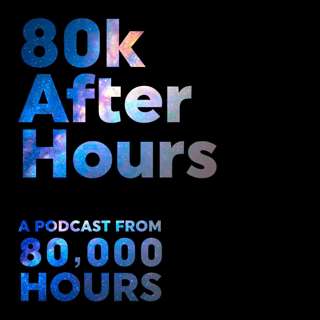
We now offer shorter 'interview highlights' episodes
Over on our other feed, 80k After Hours, you can now find 20-30 minute highlights episodes of our 80,000 Hours Podcast interviews. These aren’t necessarily the most important parts of the interview, and if a topic matters to you we do recommend listening to the full episode — but we think these will be a nice upgrade on skipping episodes entirely.Get these highlight episodes by subscribing to our more experimental podcast on the world’s most pressing problems and how to solve them: type 80k After Hours into your podcasting app.Highlights put together by Simon Monsour and Milo McGuire
5 Elo 20236min
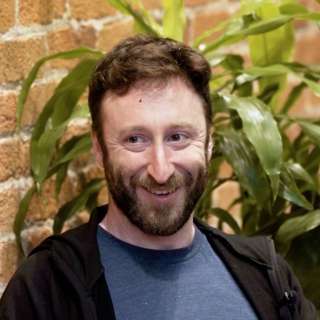
#158 – Holden Karnofsky on how AIs might take over even if they're no smarter than humans, and his 4-part playbook for AI risk
Back in 2007, Holden Karnofsky cofounded GiveWell, where he sought out the charities that most cost-effectively helped save lives. He then cofounded Open Philanthropy, where he oversaw a team making billions of dollars’ worth of grants across a range of areas: pandemic control, criminal justice reform, farmed animal welfare, and making AI safe, among others. This year, having learned about AI for years and observed recent events, he's narrowing his focus once again, this time on making the transition to advanced AI go well.In today's conversation, Holden returns to the show to share his overall understanding of the promise and the risks posed by machine intelligence, and what to do about it. That understanding has accumulated over around 14 years, during which he went from being sceptical that AI was important or risky, to making AI risks the focus of his work.Links to learn more, summary and full transcript.(As Holden reminds us, his wife is also the president of one of the world's top AI labs, Anthropic, giving him both conflicts of interest and a front-row seat to recent events. For our part, Open Philanthropy is 80,000 Hours' largest financial supporter.)One point he makes is that people are too narrowly focused on AI becoming 'superintelligent.' While that could happen and would be important, it's not necessary for AI to be transformative or perilous. Rather, machines with human levels of intelligence could end up being enormously influential simply if the amount of computer hardware globally were able to operate tens or hundreds of billions of them, in a sense making machine intelligences a majority of the global population, or at least a majority of global thought.As Holden explains, he sees four key parts to the playbook humanity should use to guide the transition to very advanced AI in a positive direction: alignment research, standards and monitoring, creating a successful and careful AI lab, and finally, information security.In today’s episode, host Rob Wiblin interviews return guest Holden Karnofsky about that playbook, as well as:Why we can’t rely on just gradually solving those problems as they come up, the way we usually do with new technologies.What multiple different groups can do to improve our chances of a good outcome — including listeners to this show, governments, computer security experts, and journalists.Holden’s case against 'hardcore utilitarianism' and what actually motivates him to work hard for a better world.What the ML and AI safety communities get wrong in Holden's view.Ways we might succeed with AI just by dumb luck.The value of laying out imaginable success stories.Why information security is so important and underrated.Whether it's good to work at an AI lab that you think is particularly careful.The track record of futurists’ predictions.And much more.Get this episode by subscribing to our podcast on the world’s most pressing problems and how to solve them: type ‘80,000 Hours’ into your podcasting app. Or read the transcript.Producer: Keiran HarrisAudio Engineering Lead: Ben CordellTechnical editing: Simon Monsour and Milo McGuireTranscriptions: Katy Moore
31 Heinä 20233h 13min
